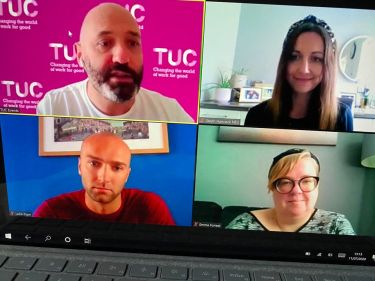General Council Report 2021

4.1 Introduction
Working with and supporting unions to be as effective in the workplace as possible is a critical goal for the TUC. Enabling union reps to develop the knowledge, skills and confidence to represent their members has been made more challenging during the pandemic and our Trade Union Education team has built on the experience of developing and delivering online education to ensure that we have continued to deliver mainstream programmes for reps across all of our regions as well as providing bespoke support on a wide range of issues, from employment rights during furlough to ensuring employers are managing the pandemic safely and tackling mental health issues at work.
The Organising Pledge launched in July 2020 has helped provide focus for the challenge faced by all trade unions. The most recent evidence on union membership growth shows some great successes in many areas, but also highlights the task for trade unions in reaching into and growing union membership in the private sector.
As with other issues and areas of work, the restrictions on operating during the period of lockdown have accelerated union innovation and use of technology. Unions have increasingly used digital communications to reach and engage their members and activists and the vast majority of the hundreds of thousands of members recruited in the last year have joined their trade union via an online platform. The TUC’s Digital Lab has supported unions to take advantage of the opportunities afforded by innovation and to align them to organising outcomes.
4.2 Organising and union membership
Between 2019 and 2020, according to statistics from the Labour Force Survey released by the Department for Business, Energy and Industrial Strategy (BEIS) in May 2021, trade union membership increased by 118,000. This is the fourth consecutive year in which it has risen. This was propelled by an increase in trade union membership in the public sector of over 200,000. There are now 6.56 million trade union members in the UK. Union density also increased and now stands at 23.7 per cent.

Union membership in the private sector fell by 100,000. This is the lowest level of membership in the sector recorded since 1995. This fall reflects a reduction of over 300,000 in the total number of employees in the sector.
Despite this, the movement should take confidence from another year of growth and one in which the TUC and affiliates united to address the key strategic organising and membership challenges that we face.
Following Organise 2020, the TUC and affiliates have been working to deliver on the commitments of the Organising Pledge, signed by all members of the TUC General Council and the general secretaries of all TUC affiliates. The pledge committed the movement to addressing the following six strategic challenges:
- increasing the number of workers aged under 30 in our movement
- enthusing thousands of activists from all backgrounds to become new workplace reps, offering them training within the first six months and training every new rep within their first year
- working cooperatively as TUC unions to bring trade unionism into new and growing sectors
- working jointly to eliminate insecure employment, including agreeing and pushing common bargaining agendas across sectors
- modernising how unions operate, organise and communicate for a digital-first era
- driving up union membership in workplaces where we already have recognition agreements with employers.
TUC Digital Lab
The TUC’s Digital Lab project is in its third year. This year has been dominated by the need for digital change to keep working effectively during lockdowns and social distancing, and many unions have made considerable progress towards this. Work done here will remain valuable to unions in coming years as, while lockdown will pass, trends like working from home will be here to stay.
To address this, the Digital Lab convened a group of senior union leaders to define the key groups of issues facing unions as they adjust to the ‘new normal’ of operating post-pandemic. The TUC will shortly publish a report into good practice ideas across 27 challenges for unions, and the Digital Lab will support affiliates in developing this work within their own organisations.
During 2020 and 2021, the Digital Lab has also investigated how unions might respond to digital disruptor services that are starting to operate in areas traditionally more associated with unions. Findings from a workshop with General Council members and case studies from three unions were incorporated into a published report, Unions and Digital Disruptors.
Following 2019’s successful introduction of a digital change module into the TUC’s Leading Change leadership development programme, an opportunity was added for previous Leading Change alumni to update with the new module as a standalone course. In support of the Organising Pledge, a digital campaigning bootcamp series helped practitioners from across TUC affiliates learn and discuss the latest techniques in digital mobilisation.
Several Digital Lab pilot projects with affiliates had to be put on hold as they would have required working physically with reps. As lockdown relaxes, these are being restarted, or transitioned into an online form. Work has been done with BFAWU to test using digital organising techniques to engage with hard-to-reach workers. A pilot with RCM has sought to identify and test opportunities to improve the accuracy of member data.
The TUC has undertaken work on different aspects of how to recommend which union prospective members should join – significantly increasing the proportion of the thousands of users who complete the union finder tool on the TUC website every month, and are directed on to affiliate websites. Another project has developed guidance in capturing useful organising data from paid social media campaigns with non-members.
The Digital Lab has collaborated with a cooperative tech developer to produce Join Together, a best-practice online joining tool that can be used by TUC affiliates in a simple and cost-effective way, integrated with their own brand and office systems. A Digital Lab report benchmarking how unions are using digital to sign up members was also published.
The TUC’s Megaphone.org.uk online campaign network has grown in usage and scope. More than 400,000 people have taken a campaign action on the platform, with 18 affiliates having used it to run their own petitions or email campaigns. The platform has enabled greater segmentation of supporters for organising and helped unions establish ongoing communication with non-members in target employers or sectors.
Megaphone has also supported greater use of new digital organising techniques, such as enabling supporters to run their own MP lobbying events as part of the TUC’s campaign for a pay rise for key workers.
5.3 TUC Communications Awards
In 2021, we were pleased to recommence the awards after a gap in 2020 due to the pandemic. Seventeen unions took part, with 39 individual entries showcasing high-quality communications from across the union movement.
The judges were Helen Watson of the NEU (representing the overall winner from 2019); Hannah Al-Othman of The Sunday Times; Dan Paskins from Save the Children; and Neha D’Souza of digital and campaigns agency Small Axe.

At the online awards ceremony on 20 July, union communications professionals and members of the General Council celebrated the strength and diversity of union communications and campaigns. The entries included many digital initiatives as well as traditional hardcopy newsletters. A number showcased speedy, effective responses to the pandemic as well as different ways of keeping members, reps and activists informed. The TUC general secretary introduced the awards and the president awarded the certificates.
The winners were:
Best membership communication
UNISON
Best communication for reps and activists
Prospect
Best campaign communication
CWU
5.4 Young workers
TUC analysis has revealed younger workers have experienced the highest rates of redundancy, largest falls in employment, highest rates of furlough with reduced pay, largest falls in weekly pay, and the largest falls in hours worked since the start of the pandemic.
Almost two-thirds of those who have lost jobs since the start of the pandemic are young workers. Young Black and minority ethnic (BME) people are particularly impacted.
In our submission to the spring budget and in written and oral evidence to government inquiries, the TUC set out the case for increased, targeted support for young workers whose future pay and progression opportunities are negatively impacted by the long-term scarring effects of unemployment.
Following the launch of the Kickstart initiative, the TUC has developed a guide for reps to enable trade unions to negotiate good-quality job opportunities for young workers. Greater investment is needed to widen and expand the scheme to ensure it reaches all young people in need of it.
Guided by resolution 32, the TUC and members of the Young Workers Forum worked closely with affiliates to organise more young workers and to address job insecurity, low pay and toxic workplace environments that are contributing to a mental health crisis among our young people, organising roundtables and webinars during Young Workers’ Month.
5.5 TUC Education
TUC Education exists to provide unions and their workplace reps with high-quality training that enables them to organise, campaign and represent members collectively and individually. Our training is delivered in classrooms via our partnerships with further education (FE) colleges in England and Scotland and also online. We have adapted to deliver our training to reps in whatever way they find most accessible and useful, whether that is in a classroom, online or a combination of both.
Reps on Stage 1 training in 2020
As part of the challenge in the TUC Organising Pledge to find and train the next generation of unions reps, TUC Education committed last year to reporting the number of new reps attending Stage 1 courses.
In 2020, the number of reps attending TUC Stage 1 courses delivered by TUC Education centres in England and Scotland was 2,104 (in 2019 the number was 4,156). The breakdown across each of the three Stage 1 courses (with figures for the previous year in brackets) was:
- Union Reps Stage 1–1,171 (2,331)
- Health and Safety Stage 1–869 (1,424)
- Union Learning Reps Stage 1–64 (401)
In addition to the above, the number of reps completing Stage 1 training using TUC Education Online versions of these courses was:
- Union Reps Stage 1–170
- Health and Safety Stage 1–197
- Union Learning Reps Stage 1–29
Our offer to reps
During 2020 we continued our investment in online courses and materials, as well as updating the materials used in classrooms, for the three core courses Union Reps 1, Health and Safety 1 and Union Learning Reps 1.
Our online offer is now well established, and reps can complete online versions of the three core courses, access eNotes, short micro learnings and webinars. These can all be accessed at tuc.org.uk/training
Online training and support for union reps
Prior to lockdown, 45 per cent of reps completing Stage 1 training courses did so online. In 2019, 51 per cent of Union Reps Stage 1 learners completed their course in the classroom, with 57 per cent of all Union Learning Reps 1 learners completing their training online.
Following research by Exeter University into the support offered to reps by TUC Education, we made the decision to replace our existing Learning Management System (LMS) with a new learning platform.
With colleges unable to deliver classroom courses due to the pandemic, we decided to bring forward our plans to move all union rep training online and to launch the new learning platform earlier than originally planned. The delivery of online courses changed from online self-study programmes to a tutor-led online offer.
We soft launched Stream in September 2020, with most of our courses made available. Other courses (including diploma courses and self-study online learning) were delivered through our existing LMS.
Before the autumn term began, we ran a series of training sessions for TUC Education Centre tutors. In total 62 tutors have been given training in the use of Stream and tools for online course delivery. We are currently developing a series of videos and resources to provide further development of tutors and affiliates.
Most of the work focused on developing online content to replace courses that had previously been taught in classrooms. In September 2020 we were able to run 27 TUC tutor-led online courses and supported UCU and UNISON to run expanded online training programmes via our learning platforms. UCU and UNISON had previously worked closely with us to develop their online training for reps.
Despite the impact of the pandemic on our training programme, TUC Education managed to successfully deliver 148 courses between April 2020 and February 2021. This includes 73 TUC training courses. The most popular TUC courses are the Certificate in Employment Law, Union Reps 1 and Health and Safety 1. We have trained over 500 reps on these courses.
Webinars
During 2020, TUC Education ran a total of 23 webinars. There were over 17,000 registrations, with an average registration rate per event of 586. The highest-performing webinars in 2020 occurred in the first three months of the first lockdown and three of the top five focused on health and safety and the pandemic (see Table 3).
Representatives from a wide range of unions have attended our webinars. Reps from many smaller specialist unions, including Accord, Aegis, BDA, FDA, NAHT and URTU, have taken advantage of their flexibility and convenience.
Microlearning
At the beginning of the first lockdown, we took the decision to create accessible coronavirus-related content to support union reps. The content needed to respond to specific issues but also be accessible and clear enough to provide reps with key information related to the pandemic.
Each module contains approximately five minutes of learning. In comparison, regular eNotes are 15–20 minutes long. Reducing the overall length allowed us to produce a total of four learning modules (see Table 4).
Table 4: Number of registrations for each microlearning module
To date, there have been over 44,000 unique viewings of the coronavirus-related microlearning. ‘Return to safe workplaces’ has proven to be the most popular, with almost 20,000 learners accessing the module.
eNotes
During the pandemic, workplace representatives have continued to access the TUC Education suite of short interactive learning modules, eNotes. During 2020, eNotes were viewed a total of 6,857 times.
Digital training support for affiliates
In addition to supporting online delivery of the TUC core programme, TUC Education has continued to support unions’ own online training for reps and activists. Over the last year this has included:
- assisting UNISON to deliver 46 courses attended by over 1,000 reps
- delivering core training for UCU covering over 450 activists
- working with ASLEF to deliver a new flexible training offer for reps including a new online Union Reps Stage 1 course
- supporting delivery of the CSP’s induction course for reps
- helping NASUWT with its move to a new learning platform
- supporting delivery of a series of online courses by PCS including use of the TUC’s online learning platform accounts
- ongoing work with RMT to develop a digital credential framework.
Online organising training for reps
TUC Education is currently developing a series of short online, self-paced, asynchronous and self-directed learning modules on union organising for workplace representatives. The aim of the new modules is to give union reps a greater understanding of union organising techniques and practices.
The new online learning modules present the skills and knowledge reps need to:
- increase the number of workers joining their workplace union
- encourage members to play an active role in their union and find the next generation of activists and reps
- design successful campaigns that will improve the working lives of their colleagues
- use digital to support branch organisation.
Each of the new organising modules is short, interactive, up to date, accessible and user-friendly. Each module functions as a discrete piece of content as well as forming part of a self-directed online series. The content can be adapted and repurposed for tutor-led, blended or classroom delivery. We expect to launch the full programme by Easter.
Union professionals and the Organising Academy
In 2020, we took advantage of the hiatus caused by the pandemic to consult with unions on their requirements from these programmes. Our intention in late 2021 is to relaunch both programmes with updated content delivered both in person and online.
Leading Change
Due to the pandemic, there was no Leading Change programme in 2020. However, the TUC has recently announced dates for the 2021/22 programme.
5.6 Trades councils and unemployed workers’ centres
Many trades councils have managed to shift to virtual meetings and online events and this was reflected in a high number of virtual events to commemorate International Workers’ Memorial Day and May Day celebrations. The national committee has met online throughout the year and has helped to shape the wider TUC priorities around tackling racism and harassment, the lack of access to reasonable sick pay and the government’s response to the broad economic challenges in the wake of the pandemic.
During Heart Unions week, trades councils organised a range of actions, within the limitations of public health restrictions. Defending universal credit was a key theme of action for trades councils throughout the year. Trades councils and unemployed workers and community centers campaigned to maintain the uplift.
Trades councils and the TUCJCC have supported the TUC’s Key Workers Need a Payrise campaign. The recent pandemic has brought into stark relief the difference between how much we rely on key workers, from hospital and care staff through to bus drivers and retail workers, and many in-between, and how they are valued by their employers, as demonstrated in their pay packets. Trades councils have mobilised support for key workers and the pay campaign at a local level.
The TUCJCC responded to a call from trades councils to provide support on the impact of rising banking charges, investigating banking charges options and providing advice on alternatives for trades councils to consider.
5.7 Global solidarity
In line with the General Council statement on a global recovery for working people, the TUC has continued to develop its work based on solidarity and internationalism.
The TUC belongs to the European Trade Union Confederation (ETUC), the International Trade Union Confederation (ITUC) and the OECD’s Trade Union Advisory Committee (TUAC).
The ETUC executive met in October, December, February, March, April and June. TUC members are Frances O’Grady (also on the Steering Committee), General Council spokesperson on Europe Steve Turner, Mary Bousted and Dave Prentis. The Pan-European Regional Council executive committee met in October: Frances O’Grady and Steve Turner are the TUC members.
The TUC attended the ITUC Executive Bureau meeting in October, the ITUC Human and Trade Union Rights Committee in November and the ITUC General Council in November and May. ITUC General Council titular members are Frances O’Grady and Kevin Courtney. TUC Senior International Officer Mariela Kohon is Frances’s first alternate and Gloria Mills is her second alternate. The ICTU’s David Joyce is Kevin’s first alternate and Gail Cartmail the second alternate. ITUC Executive Bureau titular members are Frances O’Grady, Mariela Kohon as her first alternate and Kevin Courtney as her second alternate. TUC General Secretary Frances O’Grady represents the TUC on TUAC.
The TUC has continued to focus on Brazil, Colombia, Palestine and Turkey as our priority countries, including chapters on these in our report on the rise of the far right. Over the year we have also shown solidarity with workers in Belarus, Burma, Hong Kong, Indonesia, the Philippines, Zimbabwe, Cuba, India, the United States and Lebanon.
The TUC held several meetings of the International and European Officers’ Network with the AFL-CIO, Labour’s Shadow Foreign and Shadow International Development team, and the Burma Campaign. In October, we held an event to launch the Challenging Amazon report. In April, we held an L7 side event with several international speakers, including a member of US President Biden’s Council of Economic Advisers.
Colombia
Trade unionists and other leaders have continued to face violence, with at least 43 protesters reportedly killed by police during recent national protests and the peace process continues to be undermined by the government.
We have worked closely with sister trade unions and participated in several international events, as well as holding two events with Justice for Colombia in September and May. We have made statements and written letters, and coordinated meetings with affiliates and the Colombian Ambassador to raise concerns. We have facilitated exchanges between prominent figures in the peace process with MPs. We took part in the UNI-Americas global campaign to stop the killings of social leaders.
Turkey
Trade unionists in Turkey continue to face repression. The TUC held roundtables for the international officers’ network with sister centres DISK and KESK to discuss the situation in Turkey and develop coordinated solidarity work. We sent a letter with education unions on the violence faced by peaceful protesters at Boğaziçi University. We facilitated a roundtable with sister centres and the Labour shadow minister in March.
Brazil

In Brazil, former President Lula da Silva – who, in 2018 and 2019 wrote letters thanking the TUC for our solidarity – had his politically motivated corruption convictions quashed by the Supreme Court and his political rights restored. He will now be free to contest the next presidential election against the far-right incumbent, Bolsonaro. We facilitated several meetings with the shadow foreign minister and our sister centre CUT, the Brazilian Workers’ Party, and with a group of indigenous leaders. The demands of the indigenous groups were passed on to the foreign secretary.
Palestine
In support of delivering resolution 66 and the General Council’s explanation, the TUC wrote to the UK government calling on it to take effective measures to ensure that the Israeli government stops or reverses any further annexation of Palestinian territory, ends the occupation and blockade of Gaza and respects the right of Palestinian refugees to return. We expressed concern about the violence in May, which resulted in the deaths of over 200 Palestinians and 12 Israelis and was linked to the forced evictions of Palestinian families from their homes in Sheikh Jarrah. We called on the government to help tackle the root causes of this violence, including by publicly opposing the violations of international law by the Israeli government, challenging the systematic discrimination faced by Palestinians, and by recognising the State of Palestine. We expressed solidarity with Palestinian workers taking part in the general strike on 18 May.
The TUC has met regularly with Labour’s shadow team on Palestine. On the UN International Day of Solidarity with the Palestinian people in November, we published a report, Justice for Palestine: promoting decent work and Palestinian rights, and shared a solidarity message by TUC President Gail Cartmail. To support delivering Congress policy, the TUC organised a briefing related to pension investments and ending company complicity in the occupation. The TUC engaged with several organisations including some that have recently found that apartheid policies and practices are being committed.
International Labour Organization
The International Labour Conference, held virtually, concluded ambitious guidance on responding to Covid, with job creation and inclusion to the fore. It adopted new policy supporting universal social protection. In the Committee on the Application of Standards, Belarus and Zimbabwe received heavy criticism for their treatment of workers. Having received support from employers and governments, Colombia escaped serious censure for its brutality; however, the TUC’s representative outlined the brutal tactics used by the government during the recent mass protests.
Hosting the L7
With the UK assuming the rotating Presidency of the G7 group of industrialised nations, the TUC became chair of the Labour 7 (L7), representing unions of the G7 countries. With the assistance of the ITUC and TUAC, we sought to influence the G7 to adopt policy reflecting the priorities of working people everywhere. Following a meeting with all L7 members to determine our priorities, the virtual L7 summit was held in April.

Focusing on the themes of democracy, health, climate and prosperity, we had excellent contributions from the global labour movement and its allies, including Guy Ryder, Director General of the ILO. Two UK secretaries of state – Thérèse Coffey (DWP) and Kwasi Kwarteng (BEIS) – also spoke. There was no ministerial focus on employment but, through lobbying by the whole L7, jobs emerged as a major G7 focus. We also made a presentation to an official-level Employment Taskforce, backed by the Youth and the Women’s 7s. Our final statement called for the G7 to “build back fairer”, focusing on universal vaccine access, better pay for key workers, investment in jobs (especially in the care sector and the green economy), a minimum tax floor to help invest in public services, and for governments and international institutions to challenge the rise of the far right.
The final G7 communiqué lacks recognition of the role of social dialogue and collective bargaining, but contains elements of many of our calls, including commitments to a just transition, strengthening public health systems, investing in green infrastructure and jobs, and to “fully respecting the ILO Fundamental Principles and Rights at Work”.
Wales
The pandemic remains the priority in Wales. In January, Wales TUC successfully lobbied for a legal duty on all employers to carry out a Covid risk assessment. A nationwide sick pay scheme for social care workers was also a key union success after months of campaigning.
Wales TUC campaigned for a green recovery and a just transition as Wales moves towards a net-zero economy.
To support this at workplace level, we developed a new guide, Greener Workplaces for a Just Transition, and a new course ‘Greening our workplaces – “green skills” for trade unionists’.
We supported development of a Welsh Government Anti-Racist Equality Action Plan.
In contrast to the UK government, the Welsh Government recommitted to the Wales Union Learning Fund and we added to our library of resources for reps with toolkits on problem gambling, younger workers and mental health.
Earlier this year the draft Social Partnership and Public Procurement Bill was published, which will introduce a social partnership duty for many of Wales’s public bodies, a fair work duty on Welsh Government and a Social Partnership Council. We have campaigned for government to require all publicly funded organisations to allow trade union access, and welcomed a letter from Welsh Government to all Economic Resilience Fund recipients that backed this.
Regions
Since the exposure of exploited workers in the garment sector in Leicester last year, the TUC has been coordinating a response on behalf of unions in the Midlands Region. A roundtable with fashion labels and unions, hosted jointly by the Mayor of Leicester and the TUC, launched a ground-breaking Workplace Access Agreement to give unions routes into workplaces, prior to membership, within the supply chain of key fashion brands. ASOS, Missguided, New Look and Very have now entered an agreement with the TUC to allow unions access to its factories to ensure that minimum workers’ rights are being upheld. In addition, two outreach workers are being funded, jointly by fashion labels and unions, to enter the factories to recruit union members, and to work within the community to ensure a joined-up approach is adopted.
Our regions have been working with leaders in mayoral authorities to develop employment charters to drive up employment standards and facilitate union engagement with employers to support organising outcomes. Regional TUCs are building learning and skills partnerships in areas with devolved adult skills budgets to focus on trade union education and union-led learning at work, and supporting trade union learning reps to network and support their members access opportunities to learn and develop their skills.
Stay Updated
Want to hear about our latest news and blogs?
Sign up now to get it straight to your inbox



